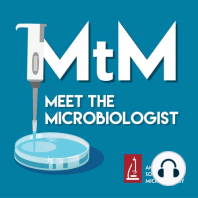24 min listen

125: Coronavirus Antiviral Drug Discovery with Timothy Sheahan
125: Coronavirus Antiviral Drug Discovery with Timothy Sheahan
ratings:
Length:
53 minutes
Released:
Jan 31, 2020
Format:
Podcast episode
Description
Are there drugs that can treat coronaviruses? Timothy Sheahan talks about his drug discovery work on a compound that can inhibit all coronaviruses tested so far, and tells how his career path took him to pharmaceutical antiviral research and then back to academia. Julie’s Biggest Takeaways: Even though the MERS-CoV was discovered as a human pathogen in 2012, it was likely percolating as a disease agent for a long time before that. Banked camel serum provides evidence that the virus had been circulating in camels for several decades prior. Differentiated ex vivo lung cultures allow study of virus infection in a 3D model representation for studying viral infection, including target cell types of both MERS-CoV and SARS-CoV. SARS-CoV prefers ciliated epithelial cells Ace2 MERS-CoV prefers nonciliated epithelial cells DPP4 Coronavirus disease in people takes place over a course of about 2 weeks. In mice, the disease is similar, but progression is faster, taking about 1 week. The drug remdesivir (RDV) is a nucleoside analog that inhibits the coronavirus RNA-dependent RNA polymerase (RDRP). Remdesivir activity has not been tested against nCoV2019, but similarity to other viruses is promising. Bioinformatic approaches show that the nCoV2019 RDRP is 99% similar and 96% identical to SARS-CoV RDRP. Remdesivir works against every coronavirus tested so far, including viruses with highly divergent RDRP sequences, so remdesivir is likely to be effective again nCoV2019. Experiments must still be performed before reaching this conclusion, of course. Tim also hopes to discover the genetic determinants that will allow a chronic hepatitis C virus (HCV) infection in mice, but not standard inbred mice. He uses outbred mice meant to mimic the diversity of the human population, and strengthen the results. Understanding these determinants would inform human studies to better understand chronic HCV infection. Links for this Episode: MTM Listener Survey, only takes 3 minutes. Thanks! TWiV 584: Year of the Coronavirus Timothy Sheahan website at University of North Carolina Sheahan T.P. et al. Broad-Spectrum Antiviral GS-5734 Inhibits both Epidemic and Zoonotic Coronaviruses. Science Tranlational Medicine. 2017. Sheahan T.P. et al. Comparative Therapeutic Efficacy of Remdesivir and Combination Lopinavir, Ritonavir, and Interferon Beta against MERS-CoV. Nature Communications. 2020. Agostini M.L. et al. Coronavirus Susceptibility to the Antiviral Remdesivir (GS-5734) is Mediated by the Viral Polymerase and the Proofreading Exoribonuclease. mBio. 2018. ASM Coronavirus Resource Page HOM Tidbit: Baltimore D. In Vitro Synthesis of Viral RNA by the Poliovirus RNA Polymerase. PNAS. 1964.
Released:
Jan 31, 2020
Format:
Podcast episode
Titles in the series (100)
MTS6 Bruce Rittmann - Microbes, Waste and Renewable Energy by Meet the Microbiologist